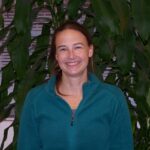The Presidential Membership Initiative was launched in 2020 as a way for the Genetics Society of America to invite talented and creative individuals from diverse backgrounds into our community. We are pleased to introduce the next cohort of Presidential Members. Throughout 2023, they will network with one another and with other Society and Board members, participate in GSA Conferences, and be valued additions to our community. Welcome, Presidential Members!
We are introducing Presidential Members this week, so be sure to check back and meet your new colleagues.

Carolyn Remsburg
Graduate Student, Song Lab, University of Delaware
I am currently studying the role of microRNAs during development, but I am joining a lab as a postdoc and studying meiosis.

Isobel Ronai
Postdoc, Extavour Lab, Harvard University
Ticks are a major health threat in the United States, with half a million people suffering from Lyme disease every year. My research focuses on developing tick control strategies to prevent tick-borne diseases of medical and veterinary importance.

Padmina Shrestha
Graduate Student, Mills Lab, Cold Spring Harbor Laboratory
I am interested in understanding chromatin dynamics and gene regulatory networks assisting cell fate commitment during development. Currently, my project focuses on understanding the role of a chromatin remodeling protein Chd5 in neurogenesis.

Enzo Silva
Graduate Student, Ecotoxicology In Vitro Lab, Federal Univeristy of Parana
I work with the development of New Approach Methodologies (NAMs) to assess toxicity based on non-coding RNAs as biomarkers.

Anand Singh
Ramalingaswami Fellow, Interdisciplinary School of Life Sciences, Banaras Hindu University, Varanasi, India
Nonsense-mediated mRNA Decay (NMD) is a translation-dependent RNA quality-control process that selectively degrades abnormal mRNAs in eukaryotic cells. We are investigating the role of NMD in fine-tuning of gene expression to maintain cellular homeostasis.

Celine St. Pierre
Graduate Student, Lawson and Wang Labs, Washington University in St. Louis
My research explores how genetic, epigenetic, and environmental signals simultaneously impact allele-specific gene regulation. My work combines genomics, systems biology, and quantitative genetics to unravel the functional consequences of gene expression imbalances on metabolic traits in mice.

Katherine Thompson-Peer
Assistant Professor, University of California, Irvine
My lab studies how neurons regenerate dendrites after acute injury. We use genetics and microscopy to determine why dendrite regeneration is both extremely robust but also quite disorganized.

Claudia Vasquez
Assistant Professor, University of Washington
I study molecular and physical mechanisms of organogenesis.

Dionne Williams
Graduate Student
My research studies the effects of rotenone-induced toxicity in adult Drosophila melanogaster and the neuroprotective effects of dacarbazine, a possible anti-Parkinson’s disease drug. We hypothesized that dacarbazine will confer both organismal and neuroprotection against rotenone-induced toxicity and mitochondrial dysfunction.
Not pictured:
Cameron Atighetcho
Arshad Ayyaz
Marco Antonio Carballo Ontiveros
Rajit Narayanan Cheramangalam
Jennifer Cooper
Alicia Donoghue
Arezoo Fani
Mercy Kitavi
Latrice Landry
Yi Lin
Victor Makata
Shreyasi Mukherjee
Raven Newton
Damilola Odumade
Annie Park
Edward Pietryk
Isaac Prah
Mofazzal Karim Sabbir
Ibrahim Saliu
Kuncha Shashidhar
Alyssa Solano
Caroline Solis
Surabhi Sudevan
Xianzun Tao
Liangyu Zhang




